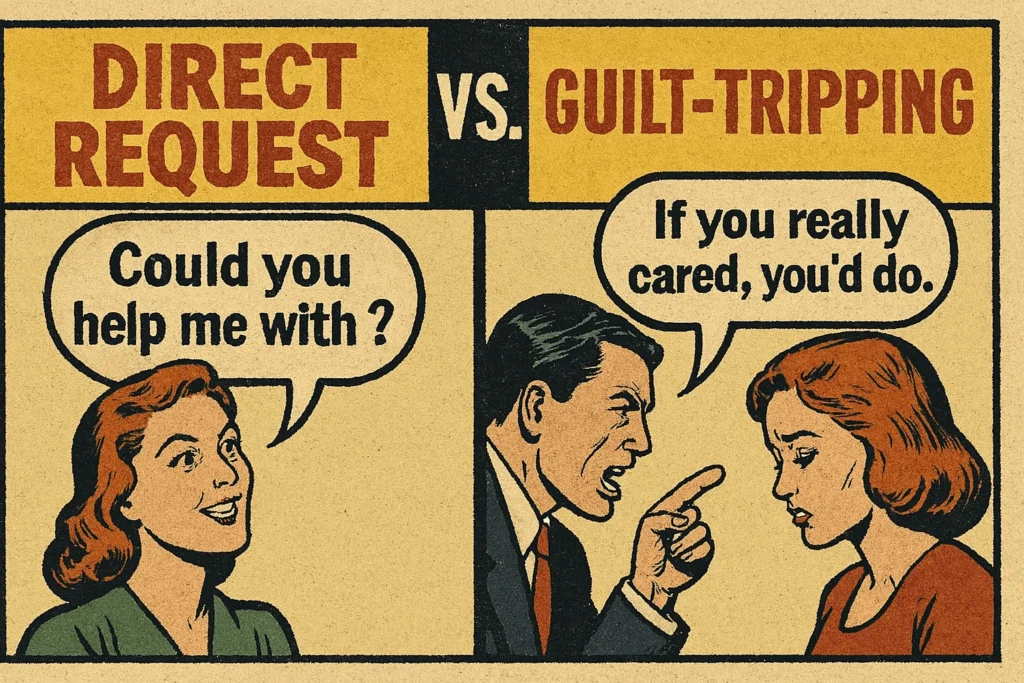How to Respond When Someone Guilt Trips You: 3 Tactics

A Quick Summary: Your Counter-Offensive Begins Now
Let’s get right down to it. You’re here because you feel a familiar, sickening weight and you need to know how to respond when someone guilt trips you. It’s the feeling of being wrong even when you’ve done nothing wrong. That weight is the manipulator’s favorite weapon.
Forget trying to “talk it out.” You are not in a communication breakdown; you are under a targeted psychological attack. In fact, this is your tactical briefing. Here, you will learn to deconstruct the weapon, identify the operator, and deploy the countermeasures that will shut down the manipulation for good.
Deconstructing the Weapon: What Guilt Trips Actually Are
First, you must understand the mechanics of the weapon being used against you. A guilt trip is not a genuine expression of someone’s hurt feelings. On the contrary, it is a form of emotional blackmail. It is a calculated act designed to make you feel responsible for the manipulator’s emotions, thereby controlling your actions.
It is the critical difference between:
- Healthy Communication: “I feel hurt when you cancel our plans.”
- A Guilt Trip: “Never mind, I’ll just sit here alone again, I’m used to it. I know how busy you are.”
The second statement is a poison dart. Ultimately, it’s designed to make you feel like a bad person, forcing you to change your behavior not out of respect, but out of a desperate need to alleviate the guilt they’ve just injected into your system.
The Predator’s Motive: Why Is Guilt-Tripping Toxic?
To disarm the weapon, you must understand the user’s objective. A person who resorts to guilt-tripping is not seeking connection; they are seeking control. The data shows countless people are asking, “Why is guilt-tripping toxic?” The answer is simple: because it is never about love. It is a key part of many a toxic relationship.
- It is a tool for the insecure. They lack the skills for healthy communication, so they resort to passive-aggressive behavior to manipulate you into meeting their needs.
- It is a power play. By making you feel responsible for their happiness, they place themselves in a position of moral superiority and you in a position of perpetual debt.
- It is a way to avoid accountability. A skilled guilt-tripper can twist any situation to make themselves the victim, ensuring they never have to take responsibility for their own actions or feelings.
As one survivor powerfully stated in a YouTube comment, “I go totally ballistic and re-assert my boundaries right away… I do not tolerate this in any form and I view it as a form of abuse… Anyone that uses these tactics, has no real honest concern for you. Better understand this upfront and accept the loss of that person.”
The Most Common Battlefield: Guilt Trips in Families
While guilt trips can come from anyone, the most damaging and confusing attacks often come from the people who are supposed to be your safest harbor: your family. When a parent or a family member uses guilt-tripping, the manipulation is ten times more potent because it’s wrapped in the language of love and obligation.
You hear phrases like:
- “After all I’ve sacrificed for you…”
- “I guess you don’t have time for your own mother anymore.”
- “Fine, I can see I’m not important to you.”
This is not love. It is a toxic form of emotional control. In fact, it conditions you from childhood to believe that your autonomy is a betrayal, and that setting boundaries is an act of cruelty. This insidious programming is why knowing how to respond when someone guilt trips you is a critical survival skill.

The Counter-Offensive: How to Respond When Someone Guilt Trips You
You cannot win this game by playing it. You win by refusing to be a player. Your old programming will scream at you to appease, to apologize, to fix their feelings. You must defy it.
This is your new protocol for how to respond when someone guilt trips you.
- Tactic 1: Recognize and Label the Tactic (Out Loud). A manipulator’s power lies in the covert nature of their attack. Therefore, you must drag it into the light.
- Them: “I guess I’ll just have to cancel my doctor’s appointment since you won’t give me a ride.”
- You: “I understand you’re in a tough spot, but I’m not going to respond to a guilt trip.”
- Tactic 2: Use “I” Statements as a Shield, Not a Plea. Do not explain or justify. Simply state your reality and your boundary.
- Them: “If you really cared about me, you would…”
- You: “I am not going to do that. I am not willing to debate my decision.”
- Tactic 3: Refuse the Premise. A guilt trip only works if you accept the underlying (and false) premise that you are responsible for their happiness. You must reject it.
- Them: “You’re making me so unhappy.”
- You: “I am not responsible for your emotions. That is something you need to handle.”
This will feel brutal at first. However, that feeling is the conditioning breaking. It is the sound of your chains snapping.
One commenter described their breakthrough moment: “This is the video that made me realise I am not a bad person. I have been exposed to so many guilt trips back to back, blamed and shamed. This gave me a chance to look at things in a neutral manner.”
Your Questions Answered: Tactical Intel on Manipulation
What is it called when someone makes you feel worthless?
This is often a result of toxic shame being projected onto you. Tactics like constant criticism, belittling, and comparing you to others are designed to make you feel fundamentally flawed and worthless. In addition, it is a core component of emotional abuse, designed to destroy your self-esteem so you are easier to control.
What is the victim mentality guilt trip?
This is a powerful combination tactic where the manipulator portrays themselves as the perpetual, helpless victim of their circumstances (or of your actions). They use a “poor me” narrative to make you feel responsible for their suffering, thereby guilting you into rescuing them. Phrases like, “You never understand me,” are common hallmarks of this behavior.
Is bringing up the past manipulative?
It absolutely can be. When a person repeatedly brings up your past mistakes, especially in unrelated arguments, it is often one of their favorite manipulative tactics. The goal is to derail the current conversation, put you on the defensive, and make you feel guilty. It’s a classic way to maintain control by keeping you in a constant state of apology.
How does guilt affect close relationships?
Weaponized guilt is poison to close relationships. First, it destroys trust. Second, it creates deep resentment. Finally, it prevents any form of healthy communication. The person being subjected to guilt-tripping starts to feel like they are constantly walking on eggshells. Consequently, the relationship becomes a source of anxiety and obligation rather than support and joy.
What is the best way to respond when someone guilt trips you?
The single most effective way to outsmart a guilt-tripper is to make their primary weapon useless. When you stop reacting to their emotional bait, refuse to accept responsibility for their feelings, and calmly enforce your boundaries, their entire strategy collapses. Your emotional independence is the one thing they cannot defeat. This entire manifesto is a deep dive into how to respond when someone guilt trips you with power and precision.
Beyond Guilt: The Path to a Sovereign Mind
Mastering the art of deflecting guilt trips is a critical step. It is you learning to parry an attack.
But it is still a defense.
True, unshakeable power comes when you build an inner reality so strong that their weapons simply bounce off your psychic armor. It is about moving from reacting to their game to creating your own. This is where you go from tactical defense to becoming psychologically unassailable. For more advanced strategies, seeking guidance from a professional therapist can be a game-changer. You can find resources and support at the National Alliance on Mental Illness (NAMI)].
🛡️If you are ready to stop just deflecting guilt and start building a mind that is immune to manipulation, your next mission is clear.
Signal Note: Some links on this page are affiliate links. That means if you choose to purchase through them, I may earn a small commission—at no extra cost to you. I only share tools and frequencies I’ve personally tested in the loop. No nonsense. No false light. Just signal.



